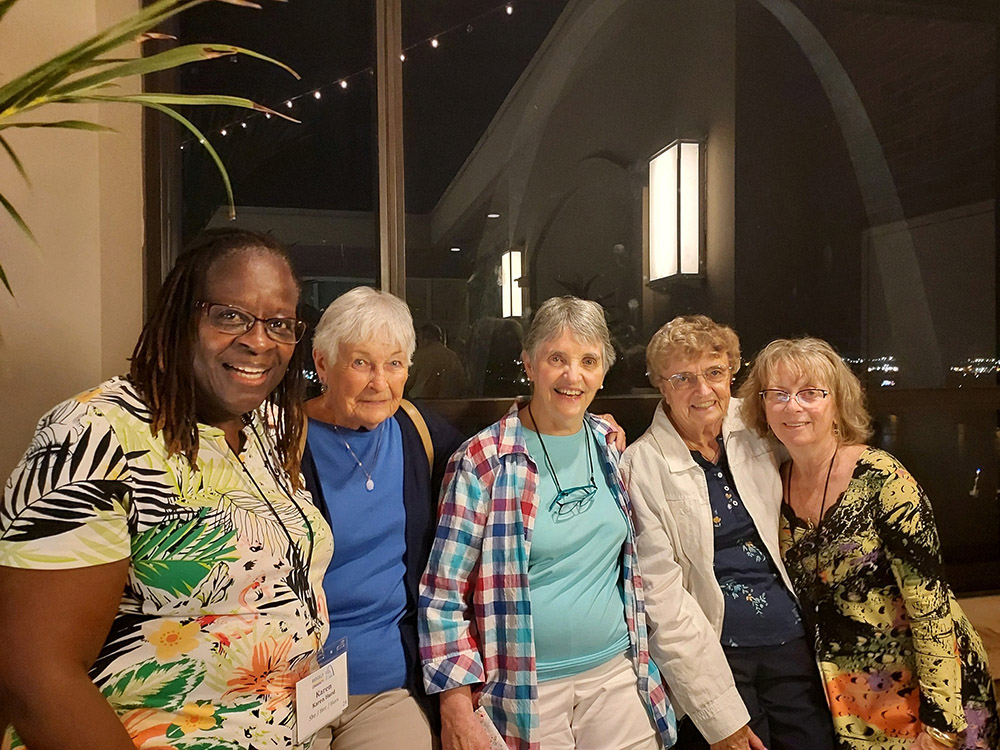
From left, agrégées Karen Hurd and Kathleen Dugan, St. Joseph Srs. Natalie Cain and Mary Ferguson, and associate Cathy Rigali at the St. Joseph Federation Event 2022 in St. Louis (Courtesy of Karen Hurd)
Since its tentative beginnings at least two decades ago, the newest way of being affiliated with the Sisters of St. Joseph in the United States is growing in size, acceptance and intercongregational relations as it extends the congregation's charism and mission and meets the needs of those who feel called to a permanent commitment.
Meet the agrégées, as they are known — women who are single, married or partnered, Catholic or not, who for the most part are at a stage in life when it is no longer feasible to become a canonically vowed sister but who want to share in the charism and mission of their chosen religious community in the fullest possible way.
Global Sisters Report first profiled the agrégée movement in 2017, when three of the 16 separately governed St. Joseph congregations in the United States had formally adopted the program. Those first three — Concordia, Kansas; Erie, Pennsylvania; and Springfield, Massachusetts — have since been joined by two more: Boston and Brentwood, New York. A sixth congregation, Carondelet, is on target to formally affirm agrégées in 2025 at its provinces, which are in St. Louis; St. Paul, Minnesota; Albany, New York; and Los Angeles.
Currently, there are more than 60 agrégées, a number that has roughly doubled since 2017, and like the number of St. Joseph congregations that accept them, the number of individual agrégées continues to grow.
"With this new mix" — vowed members, associates, partners and, now, agrégées — "the hope is that our mission will move forward in a much more vibrant way," said Sr. Phyllis Esposito, who serves as a liaison between the agrégées and leadership for her Brentwood congregation, which approved agrégées in 2021. "But if it doesn't go through leadership and get approved, it doesn't happen."
Being an agrégée 'has deepened my sense of spirituality, my relationship with God — God in myself, my neighbor, my environment.'
—Karen Hurd
The program's revival has met with resistance from both vowed sisters and associates, but "the welcoming is growing," she said, adding: "I believe and respect their vocation, and I'll do anything I can to help them."
Agrégées must be financially independent, though some live in community with canonical sisters. Most go through a formation program of one to three years. Each congregation sets its own requirements and responsibilities for belonging, though some are keeping boundaries flexible.
"It's very clear that each congregation must develop its own form in its own way," said Mary Kaye Medinger of St. Paul, a member of the evolving Carondelet agrégée group who has documented the similarities and differences among the various programs.
Medinger has had a lifelong relationship with the Sisters of St. Joseph of Carondelet, first as a student and then as a colleague in parish work. She is a former director of Wisdom Ways Center, the spirituality center of the St. Paul province, and the former co-director of associate services.
Increasingly, "canonical sisters are realizing that we are their lifeblood," said Sr. Denise Schmitz, a Concordia agrégée. (The Concordia congregation is the only one so far that allows its agrégées to use the title "Sister.") "I hear them saying, 'We want to hear your stories, your wisdom.' It feels like coming home."
Depending on the congregation, agrégées may express a standard vow or write their own. Some congregations allow agrégées to have a voice or vote in chapters or assemblies except on restricted canonical matters.
Esposito facilitates a quarterly Zoom gathering for agrégées and their sister-mentors across the country in which agrégées can take care of business, share their experiences, celebrate their commonalities and differences, and, most importantly, develop cohesiveness and deepen relationships.
Retreats in the various congregations have also fostered the movement. For instance, following a 2018 retreat in St. Paul for women discerning a call to become agrégées, 13 of the 14 participants committed to begin living as agrégées, modeling for the congregation's members what an agrégée component might mean.
In July, agrégées were invited to Event 2022 in St. Louis as agrégées rather than individual members of the St. Joseph family for the first time. There, they had a special pre-event meeting that included both those present in person and others who joined virtually on Zoom.
"That meant something to everybody," said Charlene Kellerman, an agrégée of the Erie congregation. "The fact that we could see what we've become — it was humbling and exciting. And at the end at the banquet, when they asked us all to stand up ... I get teary talking about it."
Medinger noted that intercongregational gatherings on Zoom may seem like a small thing, "but when all those faces showed up, we understood this is the realm of mystery and a call from the Spirit, and to put it under a microscope was not useful. There was just a sense of recognition and joy."
Like Kellerman and Medinger, many agrégées said in interviews they rejoice in each of these steps forward as signs of growing acceptance of their role.
"Agrégée" comes from the French for "attached to" or "aggregated with," according to the website of the U.S. Federation of the Sisters of St. Joseph, an umbrella over the 16 congregations who embrace the value of "love of God and neighbor without distinction."
The agrégées trace their roots to the earliest days of the congregation in 17th-century France, when there were two ways of being a Sister of St. Joseph: The "principal sisters" took canonical vows, while the agrégées, or "country" sisters, did not but were recognized as sisters and lived by the congregation's rules.
Advertisement
This way of belonging lay dormant for centuries until its grassroots awakening in the United States about 20 years ago, when St. Joseph Srs. Marcia Allen and Bette Moslander began researching the congregation's early history. Women experiencing a call to more intense spiritual life began learning about the history and petitioning congregations to bring the program back.
Many had long been part of the St. Joseph family as students, associates, partners in mission, or friends. Some are former St. Joseph sisters who for one reason or another requested release from their canonical vows. Some had been married but are now widowed or divorced or had their marriages annulled. Many have grown children.
Christine Carbotte, a Concordia agrégée, had been on her way to becoming a canonically vowed sister but was struggling in discernment.
On an intercongregational Zoom call in January, she said one of the sisters had told her, "Christine, you're trying to wear a shoe that doesn't fit."
But now, with her recent commitment as an agrégée, "I've found a shoe that fits," she said.

Patricia Monahan, center, and four other agrégées pose for a photo after their vow of fidelity to the Sisters of St. Joseph of Brentwood, New York, in 2021. (Courtesy of the Sisters of St. Joseph of Brentwood)
Patricia Monahan was a member of the Brentwood congregation when she requested exclaustration to care for an aging father and a sister with special needs. She remained close to the congregation, and when she learned about the agrégées from the 2017 GSR article, she knew it was the right next step for her. It gave a name to the life she'd been living for 20 years, she said.
In those congregations that allow them, there are several married agrégées, including Kellerman, who claims "a dog, a cat, and a wife" of 17 years.
"Maturity" is key to being a married agrégée, she said: It's important "to be in a relationship with a spouse who understands what this means to you," she said.
Karen Hurd, one of two African American agrégées, said she enjoys seeing "that the charism is basically the same in all of us. We're all looking for 'the more,' " she said.
Being an agrégée with the Springfield congregation "has deepened my sense of spirituality, my relationship with God — God in myself, my neighbor, my environment. This was always there, but it's developing more and more."
The diversity among agrégées is poised to expand as the word gets out. Hurd said a man is exploring the program in Springfield, and a married couple, Jennifer and Steven Tacheny, and their three teenage children are among those waiting for agrégées to be formally approved in the Carondelet congregation.

The Tacheny family in 2022 (Courtesy of the Tacheny family)
Jennifer and Steven Tacheny are engaged in the St. Joseph mission in their respective jobs and share the congregation's values with their three children: Delvin, 16; Mason, who turns 15 in March; and Nora, 13. Jennifer is director of young adult spirituality and community engagement for the St. Paul Province as well as director of the St. Kate's/CSJ Food Access Hub at St. Catherine University. Steven teaches at Cretin-Derham Hall, a private Catholic high school co-sponsored by the Sisters of St. Joseph of Carondelet and the Christian Brothers. Delvin and Mason attend the school, and it's in Nora's near future.
The couple said they strive to live simply and to engage their children with the St. Joseph community. For instance, they write and play music together for province liturgies, rituals and events.
"It's a great community," Delvin said.
Steven said it's "fun" that he and Jennifer both have a commitment to the same religious order.
"We have the privilege of talking about it in our home," he said. "We have the same language."
Jennifer anticipates that the whole family will enter a relationship with the congregation once Carondelet agrégées are formally approved.
"The language we use in St. Paul is more of a 'covenant' language as opposed to a vow," she said. "Some of the details are not worked out, and we don't know exactly what it will look like for our family, but our intention is that we make the commitment together — Steven and I for sure, then as we move forward, the children will have to [decide whether to] opt into that on their own."
So far, theirs is the only family at this stage of relationship with the congregation, but others are interested and inquiring, she said.

Agrégée Joanne Fantini leads the opening prayers at the St. Joseph Federation Event 2022 in July in St. Louis. (Courtesy of MarySue Rosenthal Gee)
Joanne Fantini, a Boston agrégée and director of St. Joseph Spiritual Ministries, said she learned about agrégées after a retreat in which she had experienced a call from God to come closer.
"It was like lightning struck," she said in an interview.
She was the first to petition the Boston congregation in 2014, and the sisters agreed to accept agrégées three years later. Fantini made her vow in 2019.
"It was like, 'There it is!' I was called before I knew what I was called to," she said. "God made a way out of no way."
Linda Boothroyd, a Boston agrégée who lives in the congregation's motherhouse in Brighton, Massachusetts, credits Fantini with stepping up when she felt the call.
"One of the greatest gifts Joanne gave to the community was coming forward with the possibility of an agrégée relationship," she said. "She had the courage and the foresight to bring it forward."
Fantini said her sister-mentor recently asked the Boston congregation "to step back and ask what God might be doing. That question lives in me and gets bigger and bigger," Fantini said.
"It's very clear," she added, "that God is doing something."







